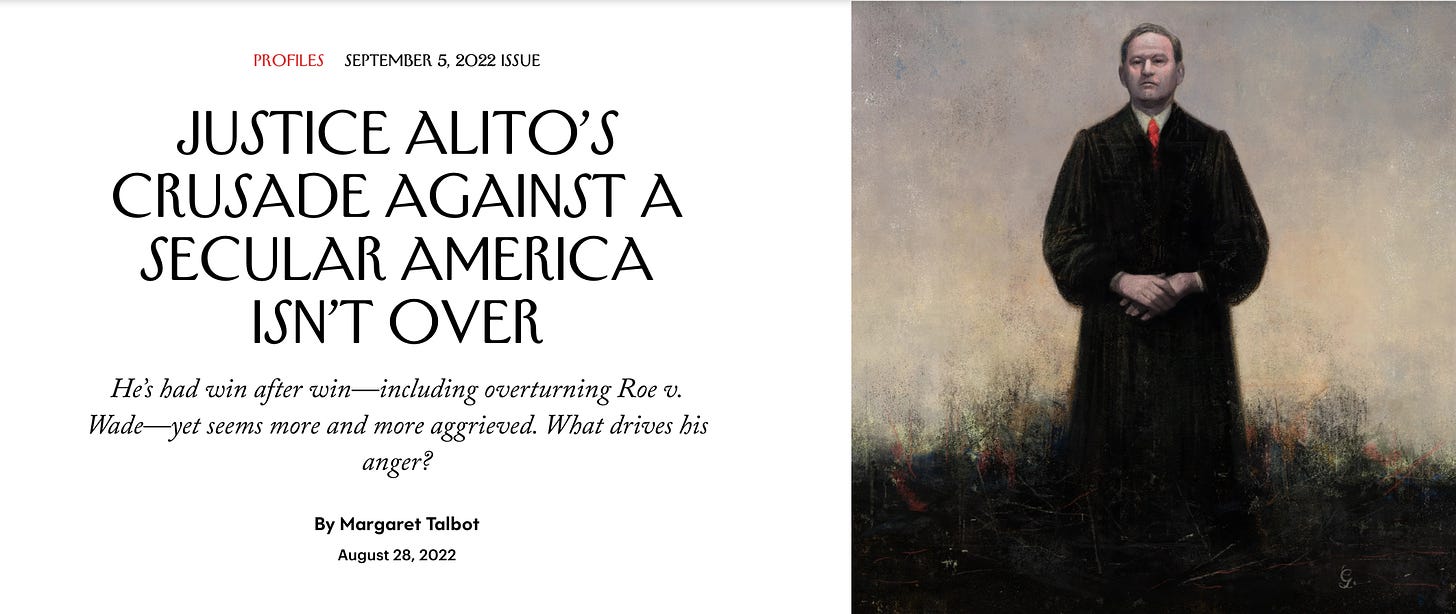The best magazine profiles practice just a little empathy. Even if the subject of a profile is a fairly unsympathetic figure, even if that is deserved, a reader ought to be able to get a sense of how the world looks from the subject’s point of view. Otherwise, a profile doesn’t do much to aid our understanding of a person or a topic — it’s just caricature, and there’s plenty of that in our discourse already.
In related news: The New Yorker has just profiled Supreme Court Justice Samuel Alito.
I’m not sure I’ve ever read a profile in this magazine that is so openly contemptuous of its subject.
Here’s a bit of flavor:
Now, though, Alito is the embodiment of a conservative majority that is ambitious and extreme. (He declined to be interviewed for this article.) With the recent additions of Brett Kavanaugh and Amy Coney Barrett to the Court, the conservative bloc no longer needs Roberts to get results. And Alito has taken a zealous lead in reversing the progressive gains of the sixties and early seventies—from overturning Roe v. Wade to stripping away voting rights. At a Yale Law School forum in 2014, he was asked to name a personality trait that had impeded his career. Alito responded that he’d held his tongue too often—that it “probably would have been better if I said a bit more, at various times.” He’s holding his tongue no longer. Indeed, Alito now seems to be saying whatever he wants in public, often with a snide pugnaciousness that suggests his past decorum was suppressing considerable resentment.
There’s nothing wrong with this kind of assessment if you can back it up, and the writer — Margaret Talbot — does. She’s a pro, I’m never going to be able to touch her accomplishments, and I’m certainly never going to end up writing for The New Yorker. So take what follows for what it’s worth.
That said, what’s striking about this piece is how little we hear from people who think Alito is doing a good job.
They might be a minority of Americans, but there’s got to be a few of them, right?
Instead, we get a Temple law professor, criticizing Alito’s tone in Dobbs:
“The mentality is ‘This should have been illegal in the first place, so who cares about those people who had a legal right one day and woke up the next day and now it’s a crime?’ ”
An Emory law professor, doing much the same:
Tonja Jacobi, of Emory, found Alito’s opinion appallingly lazy, given that it was issued half a century after Roe: “Even if you believe that life begins at conception—even if that were scientifically, demonstrably true—what do you do about that? Can you still ask someone to potentially sacrifice health and well-being—maybe their life—in favor of this other life?
And a Duke university professor:
Alito’s opinion, Neil Siegel noted, condemns Roe for having “deepened division.” The nastiness of Alito’s opinion in Dobbs, he said, “performs exactly what it criticizes Roe for doing.”
And so on. You hear from some of Alito’s friends — not Alito himself, who declined an interview — but it’s mostly about his college years, or his gossipy opinions about fellow members of the Supreme Court. You also hear a quote or two from conservative outlets like City Journal and National Review about what the Dobbs decision means for conservatism generally.
But you don’t — outside some stuff about how Alito hated the 1960s — really get a sense of how he, or his movement, justify themselves.
Which is suprising, honestly. The New Yorker profiles seemingly unsavory or problematic figures all the time, but a reader — or this one, anyway — usually comes away feeling like an issue, or a person involved in the issue, better than they did before.
With the Sam Alito profile, I mostly come away with a sense that I’m not supposed to like Sam Alito. Which, fine, but that was already the case! I suspect the same is true for most of The New Yorker’s readers.
This is not an argument for both-sidesism. But I do believe Talbot and the magazine would have served their readers better if we’d heard at least one more voice — his or that of an ally — making the case for the defense.
We have an oversupply of contempt in modern American discourse, and a fairly radical undersupply of understanding. The two aren’t necessarily mutually exclusive. But the Alito profile didn’t help me understand anything I didn’t already think I understand. It’s just a lost opportunity.





